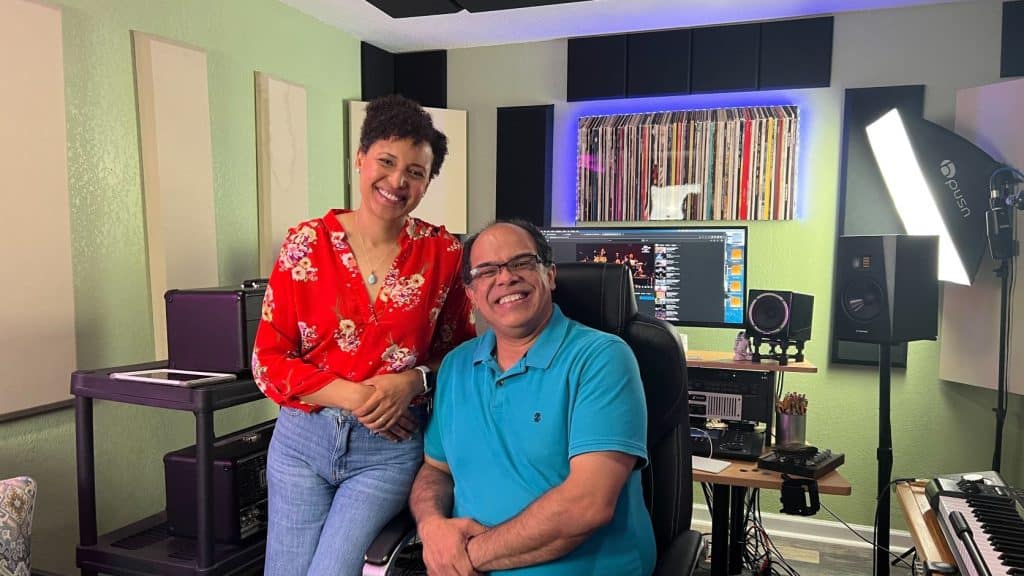As a child growing up in the town of Villa Mella in the Dominican Republic, Wanda Vásquez García fostered her creative spirit. She regularly practiced the piano and loved reading as an escape from the day-to-day. And when she complained of boredom, her mother would encourage her to grab a notebook and start writing.
“She planted that seed in me. I always knew I liked to write, but I didn’t think I had a story to share yet,” Wanda said.
Years later, in Northern Colorado, that seed has fully bloomed.
A Missing Narrative
Working as an elementary music teacher in Greeley and Lafayette, Wanda noticed a recurring pattern: Many of her students didn’t feel a connection to their traditions and heritage. They mistakenly believed they didn’t “have” culture.
Like any teacher might, Wanda searched for a children’s book she could share with her students in order to illustrate the different ways cultural roots can create a sense of belonging in our communities. She was frustrated to learn such a book didn’t exist.
“There is not enough connection to the folk music of other cultures,” she said. “Especially as an immigrant myself, I feel like if we wait too late for our students to make those connections, it’s a little bit harder to find that spirit and identity with your homeland in on your traditions.”
Wanda began to tell students more about her own culture—as an Afro-Latina woman, as an immigrant, as an avid music-lover. She discussed her racial background; as a class, they explored her home country’s culture. Wanda shared the ways she continues to learn about her heritage and how proud she is of how her roots have shaped her identity.
Eventually, she wrote the story she yearned for her young students to read—a bilingual, experiential, folk story called “Del Otro Lado De La Calle,” or “From Across the Street.”
Putting Her Story on Paper
“From Across the Street” introduces families to Pati, an American child visiting her abuelita in Villa Mella. On her vacation, Pati journeys through the town to a Dominican cultural festival called the Fiesta de Palos. Along the way she encounters new-to-her instruments, music, and folktales. At first the unknown scares her, even as it excites her.
“Pati doesn’t know what she is listening to or what it means,” Wanda said.
“The book walks through those elements of our kids’ experience as they start exploring something new. Their first reaction might be to be afraid; that’s common. But when you learn the truth of a beautiful tradition, you begin to embrace it.”
By the end of the story, Pati understands her family and herself better, and joins in singing and playing her own instrument at the festival.
Adding Composition
But what’s a story about music without music?
Wanda turned to her husband Sócrates García, jazz composer, associate professor of music and director of music technology at the University of Northern Colorado. Together, they turned her words into a fully interactive experience.
Wanda and Sócrates designed the book to be listened to rather than read alone. It comes complete with the sounds of common instruments used in Dominican music. Listeners hear the same swell of instruments that Pati does as she approaches the Fiesta de Palos.
“Los Palos is a folk tradition that has roots in our African ancestry, also our Taino ancestry—and there are some elements also of the colonizers’ culture in there, too. It’s a tradition that really unifies Dominican identity,” Wanda said.
Sócrates added: “So when we started talking about the possibility of making a book, Wanda went right away to my work.”
Also titled “From Across the Street,” Sócrates’ composition is a Dominican jazz orchestra piece named after his own experiences watching local musicians through the windows of his childhood home. It serves as the musical backdrop for Pati’s journey through Villa Mella.
“There was never any doubt about combining my music with Wanda’s story. We just needed to figure out how to do it. And she did.”
(He concluded with a sly grin: “She’s a freakin’ genius!”)
A Love Letter to Los Palos
While there are many instruments that are common across the Palos musical tradition, like the güira and the panderos, the specifics vary from community to community because of the oral nature of its history. Sócrates’ featured music is just one interpretation of the larger cultural experience.
“It’s a lot like early jazz in America,” said Sócrates. “People learned by rote; you met somebody, and that person shared orally what they knew. In the case of the Palos, it goes back through families and generations. You’ll see children playing our instruments, and it’s amazing to see because they play it at a high level because they learn from when they are so young.”
“From Across the Street” serves as a love letter, not just to the Dominican Republic and its Palos culture, but to a cast of real-life characters from Wanda’s and Sócrates’ real life.
“So many of the characters are a reflection, either of [Sócrates’] childhood or mine,” Wanda said. “The person who owns the convenience store is a dear person in our life who is no longer with us. The name ‘Pati’ is Sócrates’ mom’s name. We included all these important people in our lives who have shaped who we are as musicians.”
The final experience is an illustrated digital book featuring audio narration options in Spanish, voiced by Wanda, and English, voiced by the couple’s daughter Astrid. The festival song is Sócrates’ composition, with the individual instrument recordings performed by Dominican percussionist Edis Sánchez. Wanda and Sócrates tapped artists Karla Sing Conde and Fernando Batista to supply the artwork.
Sharing the Story in Greeley and Beyond
In publishing “From Across the Street,” Wanda hopes children understand and celebrate their own deep roots, as well as those within their communities.
“I want them to see how complex people are in in our identities. To look at me as a Dominican, you might simplify my identity. And it’s way more complex than that. I want children to notice that complexity and to feel empowered to be curious and to create connections with their own ancestors.”
As Greeley grows, helping the youngest members of our community embrace and celebrate their unique contributions to our culture is more important than ever. One way to do that is through storytelling, Wanda says.
“Tell your story. There is so much in our own identities that we tend to just leave behind or leave in the charge of ancestors. But we must keep passing our traditions on or they are going to be forgotten, especially in the face of globalization.
“It’s important to create and dedicate space for the traditions that made us who we are right now.”
How do you celebrate the roots that led you to our town? Tell your Greeley story today.







